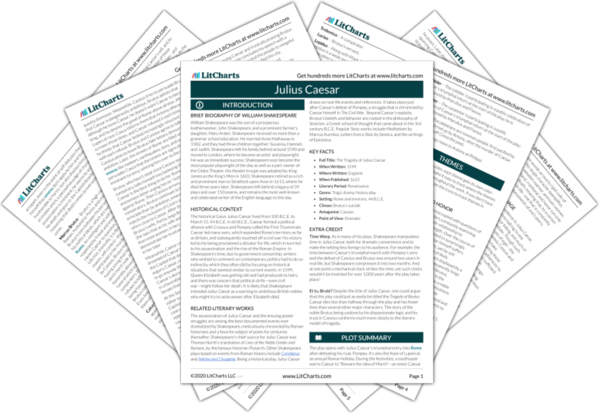In the play, Rome, because of its centrality in the history of Western civilization, often symbolizes the world in microcosm. For example, in Act 1, Cassius appeals to Brutus’s sense of honor by urging him to “think of the world,” i.e., the well-being of Rome. In fact, Brutus’s entire obsession with the good of Rome versus his love for Caesar symbolizes the conflict between social good and individual desire. On an interpersonal level, after Cassius commits suicide, Titinius laments that “the sun of Rome is set” and that the world is darkened by his friend’s absence.
Rome Quotes in Julius Caesar
But those that understood him smil'd at one another, and shook their heads; but for mine own part, it was Greek to me.
Et tu, Bruté? — Then fall, Caesar!
Cry Havoc! and let slip the dogs of war.
Friends, Romans, countrymen, lend me your ears;
I come to bury Caesar, not to praise him.
The evil that men do lives after them;
The good is oft interred with their bones;
So let it be with Caesar. The noble Brutus
Hath told you Caesar was ambitious:
If it were so, it was a grievous fault;
And grievously hath Caesar answer'd it.
Here, under leave of Brutus and the rest, —
For Brutus is an honorable man;
So are they all, all honorable men, —
Come I to speak in Caesar's funeral.
He was my friend, faithful and just to me:
But Brutus says he was ambitious;
And Brutus is an honorable man.
Remember March, the ides of March remember:
Did not great Julius bleed for justice' sake?
What villain touch'd his body, that did stab,
And not for justice? What, shall one of us
That struck the foremost man of all this world
But for supporting robbers, shall we now
Contaminate our fingers with base bribes,
And sell the mighty space of our large honours
For so much trash as may be grasped thus?
I had rather be a dog, and bay the moon,
Than such a Roman.
This was the noblest Roman of all
All the conspirators, save only he,
Did that they did in envy of great Caesar;
He only, in a general honest thought,
And common good to all, made one of them.
His life was gentle; and the elements
So mix'd in him that Nature might stand up
And say to all the world, "This was a man."












